RRFC INTERVIEW: Recording Connection mentor Chad Zuchegno on “becoming a fixture” in the studio
Spend a few minutes talking with Recording Connection mentor Chad Zuchegno, and it’s quickly apparent that 15 years in the business hasn’t curbed his passion for music. “Everyday I wake up, I’m like, ‘Thank God. So happy I can do this job,’” he says the co-founder of The Vibe Recording Studio in Ft. Myers, Florida who’s spent the past 15 years in recording.
It’s also apparent that Chad is passionate about training up new talent and seeing new up-and-comers find their place in the industry. As you’ll see the interview below, he offers some very valuable insights into the type of attitude that helps Recording Connection apprentices succeed in the business, drawing from his own experiences as an example. Enjoy!
* * * * *
RRFC: So what’s been going on at the studio lately?
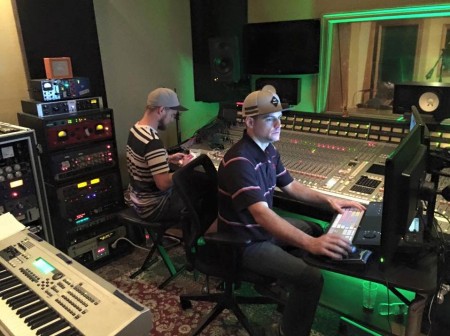
Recording Mentor Chad Zuchegno
Well, we’ve been staying steady, which is great…Last month I did a song with the drummer and the bass player for Godsmack, Tony and Shannon from Godsmack [for their new band A.B.R., formerly known as Blue Cross]. They actually live in the area, and they used to have rehearsal space with us before the last album. We did a couple of demo songs for the last Godsmack album that they used between themselves for writing the 1000hp album. But recently, they just got off the world tour in December, I think it was. And they’ve got a break before they write the next Godsmack album, so they wanted to do a side project, Tony and Shannon. So they came in and did the song…I think it was really for them to shop with our manager for a label. And I guess it worked because I guess they got a deal, and they’re doing nine songs with us in beginning of March. So that’s pretty cool.
RRFC: Is the style in the traditional Godsmack sort of drop-D?
Chad: No. Actually, it’s…the first song we did, it was still rock. It wasn’t like Godsmack. It was still pretty rock. But the actual record’s going to be, they said, hardcore blues record, if you can imagine that…I think it’s going to be like blues riff oriented and blues lyrics, blues vocals with pretty hard back beat. You know what I mean?
RRFC: What’s the scene in Fort Myers as far as music goes? What’s the biggest style there?
Chad: It’s kind of hard to say. We’ve got a pretty big mix of genres. They’re pretty heavy in hip-hop, pretty good rock, and a good variety of country as well. It’s a pretty crazy mix, but it’s good because it definitely keeps you on your toes, you know what I mean? So I can go from country to hip-hop, or metal, within an hour.
RRFC: Do you like the idea of going back and forth between different genres at the blink of an eye? Or is there one genre you’d rather work with?
Chad: I personally like going between the genres because I think it keeps you sharp as far as what you’re doing. When you’re working in a bunch of different genres, you end up cross-pollinating the genres to a certain extent. I did a country album last year…let’s see, was it last year I did the Grace Rogers record? Actually, another one I did that we just wrapped up, too, two country albums in December, and one of them I actually put like the classic hip-hop turntable spin in it, and they loved it. And it actually worked. So you end up doing things like that that you probably never think of or do unless you work in other genres…I think it keeps you sharp and it expands your knowledge. It forces you to constantly be up to date on all trends, because it’s a big part of what we do, is to stay current.
RRFC: Do you have any current apprentices or past apprentices that did a really good job that you were impressed with?
Chad: Probably the best one, the best guy that we’ve ever had is still an employee with me… Frank Gillis. He went through the course. He excelled because he paid attention. He had a day job, he’d stay here after class until like 12:00 or 1:00. He was a bakery manager so he had to get up at like four, five in the morning, running low on sleep. But he was doing what he had to do to make it work. He still put in extra time, he came in, did all of his work, did great. And when he was done, he was like, “Dude, I don’t want to stop. What can I do to do more? I know I’ve got so much more to learn.”…So, yeah, he’s actually here now in session in Studio B…He just applied and excelled and made himself a fixture.
RRFC: Very cool.
Chad: Yeah, he’s great. He’s just getting better every day, every week. It’s great to see him grow and hear his mixes…have clients come and be like, “Hey, I want to work with Dirty Frank.” Sweet.
RRFC: Dirty Frank, huh?
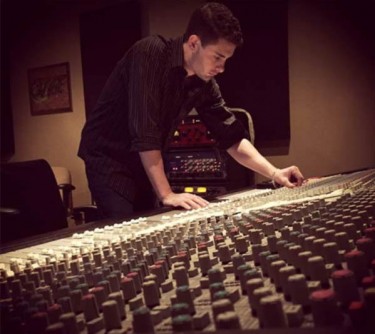
Frank Gillis
Yeah, I named him…He was sitting in on a session with me. I walked in to a band that I’ve recorded, and I’ve known these guys for years, and I was like, “Hey, guys. This is…Dirty Frank.” And he looked at me like, “What the hell did you just call me?” So it kind of grew on him, and now it’s on his business card, it’s a part of his email address. It’s actually a Pearl Jam song. He’s not a dirty guy. So actually pretty much everybody around town knows him as Dirty Frank.
RRFC: What’s one thing an apprentice with the Recording Connection program can do to impress you?
Chad: It’s just a lot of almost simple but basic stuff that goes a long way. The only people that end up having longevity in the industry are people who are go-getters, who tend to always be around and never stop moving forward and learning. So, the students who just show interest and do well…Just coming in and “Hey, I know I don’t have class today. I’ve already done my hours for the week…I’m just here to sit, and I want to be a sponge. I want to see what’s going on.” And we don’t mind being asked questions, because that’s what we do…
I look at it from how I took it when I was coming up as a student. I was offered the ability to come in and sit in on sessions as well. And I did. Any day that I wasn’t there for school, I was there all my days off. If it was my day off, it was my whole day. If I had to work that night, it was during the day until I had to go to work that night. And the same thing when I graduated. I made myself a fixture until pretty much office managers were like, “Dude, get this guy a job. He’s not going away.” It’s that tenacity that we love to see because we know that they’re just not sitting here…with a blank stare in their face. But they’re here and they’re eager and they’re willing to learn.”
RRFC: Have you noticed a change in work ethics with students in general as time goes on?
Chad: Oh, no doubt…I think it’s a lot of the entitlement. I think a lot of younger generation kids feel that “It’s going to happen. I’m going to get this job.” You’re not going to get sh*t in this business unless you go for it, because they don’t really realize that it’s not like go and applying for a normal job. It’s really a part of the entertainment business, and it’s super competitive, and the only way you’re going to get in it is if you fight to get into it…I think they need to realize that in this world in general, not just the recording studio, you’re not entitled to anything. If you want something, you’ve got to go work for it. You got to put the time and the dedication. And you know what the great thing is? If you actually do that, it’s going to pay off. It is going to be worth it.
RRFC: What kind of apprentices are you looking to take on? What personality type are you looking to be able to educate?
Chad: I wouldn’t say there’s one personality type, but just as long as their heart is gung-ho and they’re willing to do the work, they’re willing to put in the time, and they just show that they care…
In the end, it’s all about you…If you’re given the opportunity that at least I know I’m giving my Recording Connection students, there’s no reason why they shouldn’t be able to continue the longevity in the industry. It’s not because I’m great or the Recording Connection is amazing, but they’re given the tools to be able to succeed. You know what I mean? At least I feel they are.
* * * * *
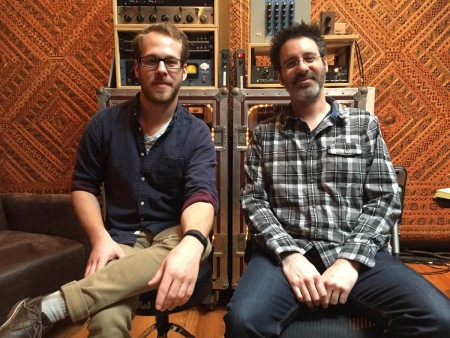
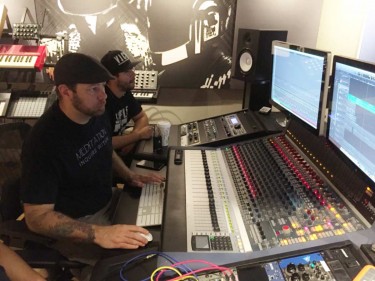 Recording Connection apprentice Angel Rivera is at The Abstract Recording Studios (Glendale, CA) joining mentor/producer/engineer Doug Boulware at the Neve console, working on a mix for the indie electro rock band Secret Agents of The Sun.
Recording Connection apprentice Angel Rivera is at The Abstract Recording Studios (Glendale, CA) joining mentor/producer/engineer Doug Boulware at the Neve console, working on a mix for the indie electro rock band Secret Agents of The Sun.
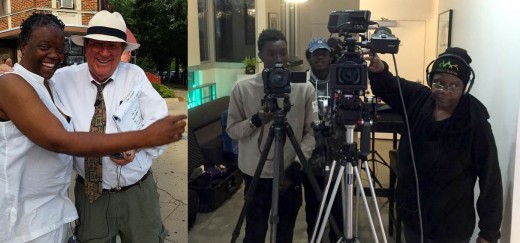 We love Film Connection student Susan Berger’s inspiration and find it downright infectious! Already an experienced professional in production, Susan is taking her apprenticeship with Mark Leisher Productions (Bethesda, MD) very seriously. Susan gives some advice to her fellow filmmakers and says, “Be more than enthusiastic with your craft. A driven passion will take you way further than your dreams. You will meet those that started out like you…clueless, yet they did more than chase their dreams, they caught them…Disappointments will come. What you do with them is a choice and a chance to keep it moving, motivated, and be mentored. Bring your A-game without compromise. No time for goofing off, getting high, playing the field and all that. Compromise nothing, complete way past your expectations and know your capabilities are limited by only you, INSPIRE SELF!”
We love Film Connection student Susan Berger’s inspiration and find it downright infectious! Already an experienced professional in production, Susan is taking her apprenticeship with Mark Leisher Productions (Bethesda, MD) very seriously. Susan gives some advice to her fellow filmmakers and says, “Be more than enthusiastic with your craft. A driven passion will take you way further than your dreams. You will meet those that started out like you…clueless, yet they did more than chase their dreams, they caught them…Disappointments will come. What you do with them is a choice and a chance to keep it moving, motivated, and be mentored. Bring your A-game without compromise. No time for goofing off, getting high, playing the field and all that. Compromise nothing, complete way past your expectations and know your capabilities are limited by only you, INSPIRE SELF!”





